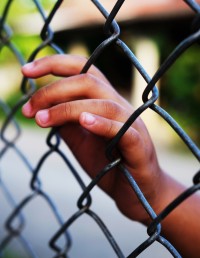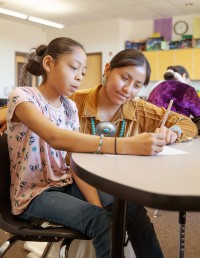NCYL Leads In Efforts To Reform California's Alternative Education Settings
California students who experience the school-to-prison pipeline often find themselves in alternative education settings, such as continuation high schools, community day schools, county-run community schools, juvenile detention schools, and independent study programs. While these settings are intended to provide additional options for students who need them, major problems and concerns persist.
The National Center for Youth Law, through community partnerships and the development of reports that examine California’s alternative education systems, has been a leader in exposing the harms of these systems and advocating for reform.
NCYL’s goal through this work is to reduce the number of students inappropriately pushed into alternative education settings, ensure students in alternative education settings have access to qualified teachers and a robust curriculum, and collaborate with community organizations and families to hold school districts, alternative schools and other stakeholders accountable for students’ outcomes, such as graduation and readiness for college or a career.
Concerns abound
There are many concerns regarding California’s alternative education settings, which disproportionately serve students of color, students in foster care and students with disabilities.
Among these concerns:
- Students may be transferred without the required opportunities to object to the new school;
- Students may never have a real chance to return back to their traditional schools;
- The curriculum and instruction in such schools can be far below the standards of traditional schools;
- Alternative settings may rely too heavily on education technology versus in-person instruction;
- Such settings may have a high level of law enforcement presence, and conversely, too few counselors and certificated teachers; and
- The statewide accountability system may not operate in a way that actually holds alternative education settings to a meaningful standard.
Supporting students
Among the ways NCYL has been a leader in this field is through the 2021 publication and accompanying presentation of “Practical Tools to Support California Students Impacted by Alternative Education,” a resource that identifies many of the challenges faced by students in alternative education settings and provides tools for adults who work in these settings and with children to better support students’ needs.
The toolkit includes practice tips for professionals to address challenges regarding students with disabilities, expelled students, and detained students, among others.
The toolkit is a follow-up to “Alternative Education in California: A Primer for Advocates and Community Stakeholders” (2021), which reviews many key aspects of alternative education in California and advocates for a shift toward more visibility, and ultimately more support, for these too-often marginalized students.
Because alternative education settings serve California’s highest need students, both alternative schools and the comprehensive school districts that transfer students to them should be held to a high standard of transparency and local, state and federal accountability. NCYL is proud to aid in ensuring this oversight.






